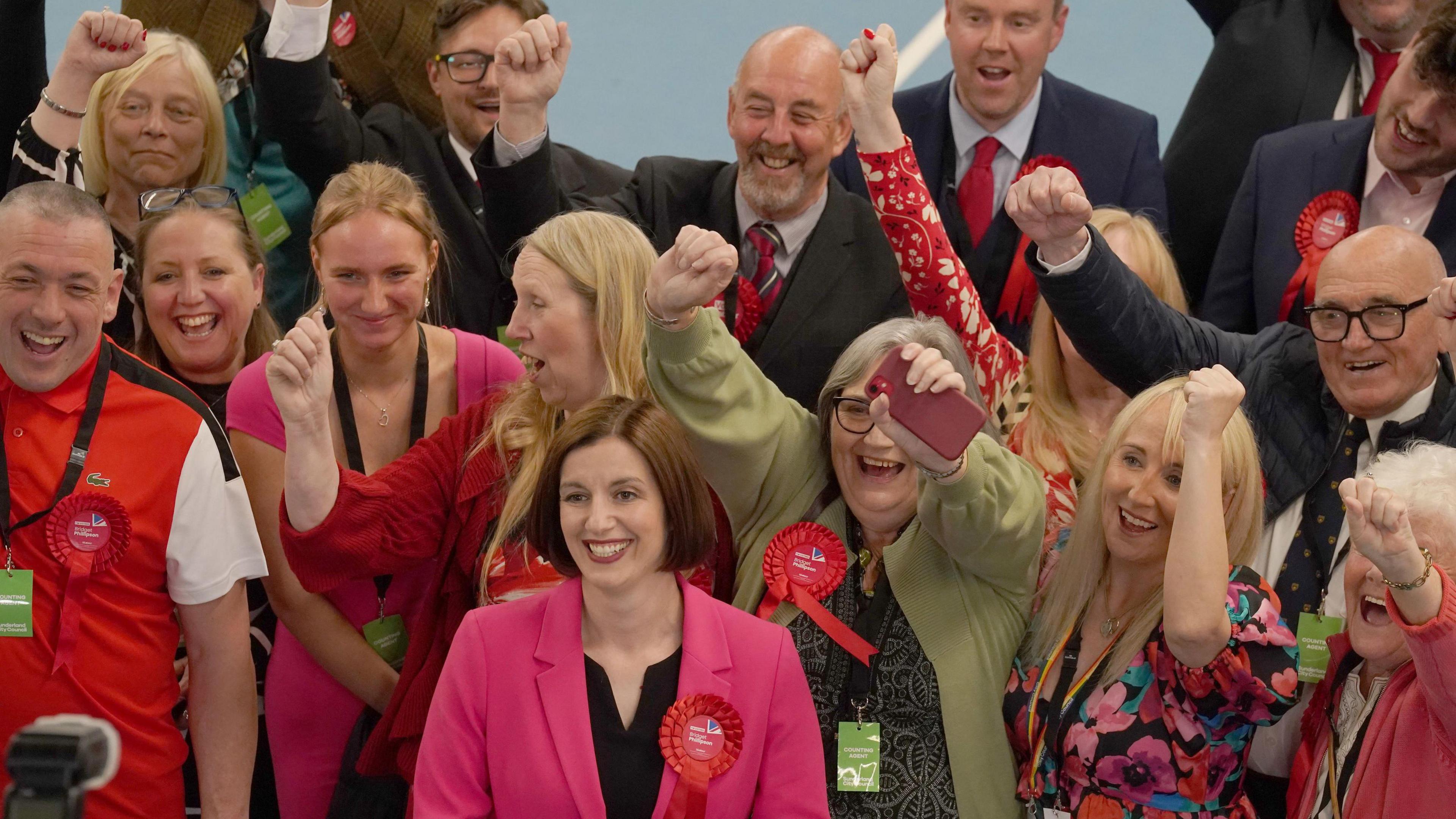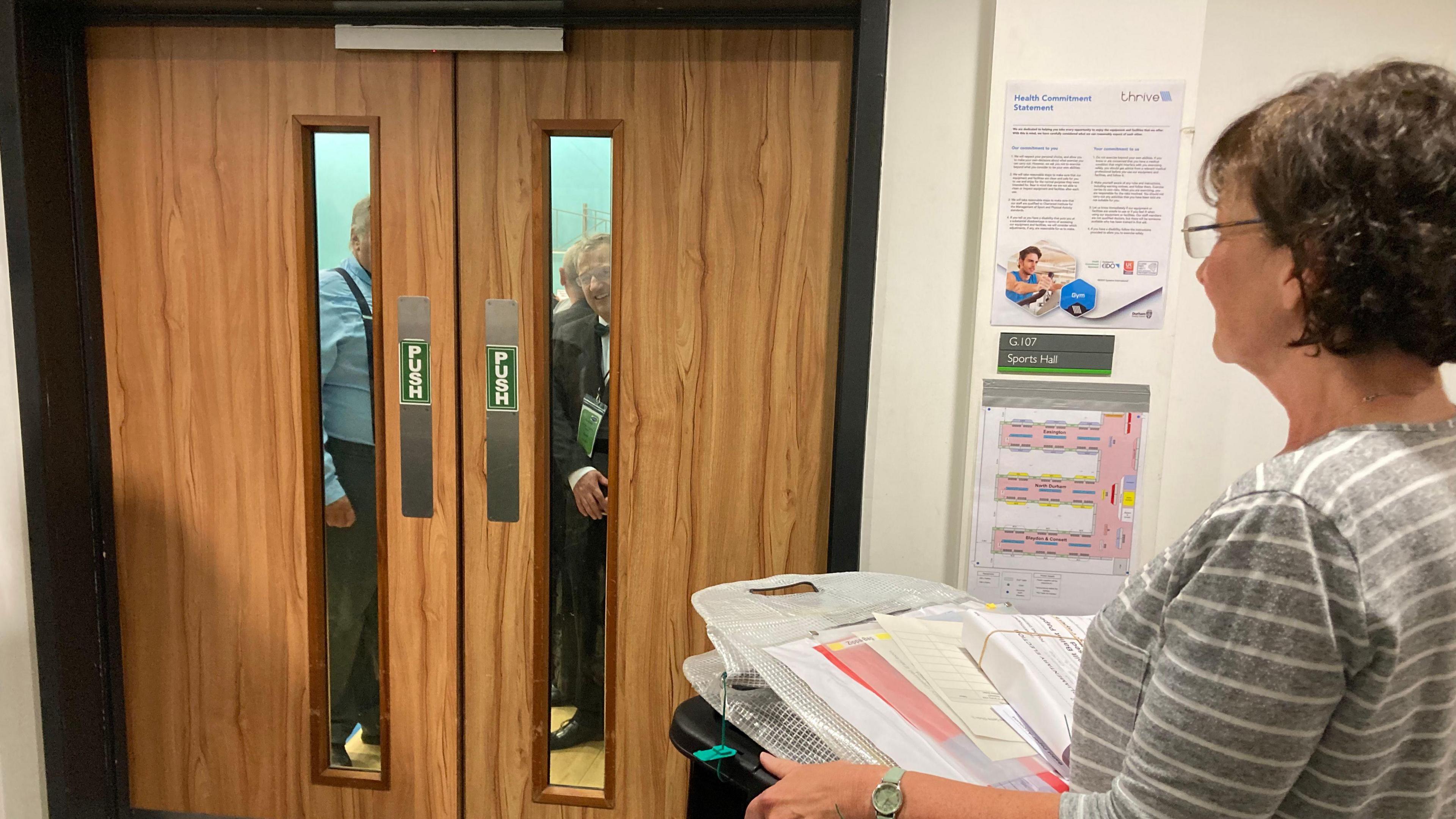Labour wins across Wearside as Reform makes gains

Labour's Bridget Phillipson said the British people had chosen change
- Published
Labour has swept up all seats across Sunderland and County Durham, with Reform coming ahead of the Conservatives in multiple constituencies.
Sunderland was once again first in the UK to declare a result, as Labour's Bridget Phillipson comfortably held Houghton and Sunderland South with 47% of the vote.
In her victory speech, she said the country had chosen "a brighter future".
Labour also gained Bishop Auckland from the Conservatives.
Speaking of the national exit poll, Ms Phillipson said: "Tonight the British people have spoken and if the exit poll this evening is again a guide to results across our country - as it so often is - then after 14 years the British people have chosen change.
"They have chosen Labour and they have chosen the leadership of Keir Starmer. Today our country with its proud history has chosen a brighter future."
In Bishop Auckland, Labour's Sam Rushworth took the seat from the Conservatives, with Tory candidate Jane MacBean coming second.
Newly elected Mr Rushworth said Bishop Auckland had "voted decisively for change".

Reform's Chris Eynon called the result "bittersweet"
Sunderland Central was held by Labour's Lewis Atkinson, with Reform's Chris Eynon coming in second ahead of the Conservatives.
Mr Eynon told the Local Democracy Reporting Service the result was "bittersweet".
"The Tories weren’t even close and it shows the fact that around here in the red wall we’re the new opposition to Labour without a doubt," he added.
Labour's Mary Kelly Foy won the City of Durham constituency, where Reform candidate Mark Belch came second, followed by Liberal Democrat Mark Wilkes.
Alan Strickland won the newly created Newton Aycliffe & Spennymoor seat for Labour, with Reform's John Grant second.
In North Durham, Luke Akehurst held for Labour and Reform's Andrew Husband was second, while Labour's Liz Twist was re-elected in Blaydon & Consett, with David Ayre coming in second for Reform.
Easington was also held by Labour, as Grahame Morris was re-elected and Reform's Lynn Murphy the runner-up.
Washington and Gateshead South was held for Labour by Sharon Hodgson who secured 48% of the vote, with Reform coming second.

A locked door provided a lot of amusement in Consett
There was a lot of amusement at Consett Leisure Centre as the first box of ballot papers was hurried from the polling station upstairs to the counting hall downstairs - only to be met by a locked door.
Officials and those stuck inside were relieved when it was unlocked after a few awkward minutes.
Analysis: The political picture across the North East and Cumbria
By Richard Moss, BBC Political editor, North East & Cumbria
It was a night of Labour triumph and Conservative disaster in the North East and Cumbria.
In the end they just avoided a complete wipeout, but only just. Deputy Party Chairman Matt Vickers’ win in Stockton West avoided that ignominy.
It leaves the Tories with fewer MPs here than at any time in the party’s modern history.
And it was not just the gains from 2019 that slipped away.
Hexham – Conservative for 100 years – was taken by Labour for the first time.
In North Northumberland, David Smith’s victory was perhaps even more remarkable. He was only selected a few days before Rishi Sunak called the election and yet overturned a majority of almost 18,000 and removed Conservative minister Anne-Marie Trevelyan.
Then there was Cumbria. The party went into the election having an effective majority in all the county’s five redrawn seats. They left it without a single MP there. Labour took four, Lib Dem Tim Farron the fifth, overcoming unfavourable boundary changes to win a 20,000-plus majority.
Conservatives had been hopeful that the Tees Valley area would be a happier hunting ground as candidates looked to tie themselves to Ben Houchen – the mayor who won across the area just two months ago. And the party’s vote did hold up slightly better, but it didn’t prevent all but Stockton West slipping away.
Scalps included former cabinet member Sir Simon Clarke, and current Levelling Up Minister Jacob Young. The party’s two County Durham seats also went to Labour.
But the night was also notable for a surge in the Reform UK vote that put them in second place in a string of constituencies. Results they will look to build on in the next two sets of local elections, with the hope of pushing for wins whenever the seats are contested again.
This though was largely a mirror image of 2019. Then it was the Conservatives pushing into previously unconquered territory, this time Labour was making new ground.
But there is a warning there. Tory wins then were founded, at least in part, on promises to "level up" the region. Voters have clearly decided that wasn’t delivered. Labour have promised change and hope. If they don’t deliver then the party cannot be sure the same fate may await, and Reform UK in particular could be waiting to capitalise.
Follow BBC North East on X (formerly Twitter), external, Facebook, external and Instagram, external. Send your story ideas to northeastandcumbria@bbc.co.uk.
